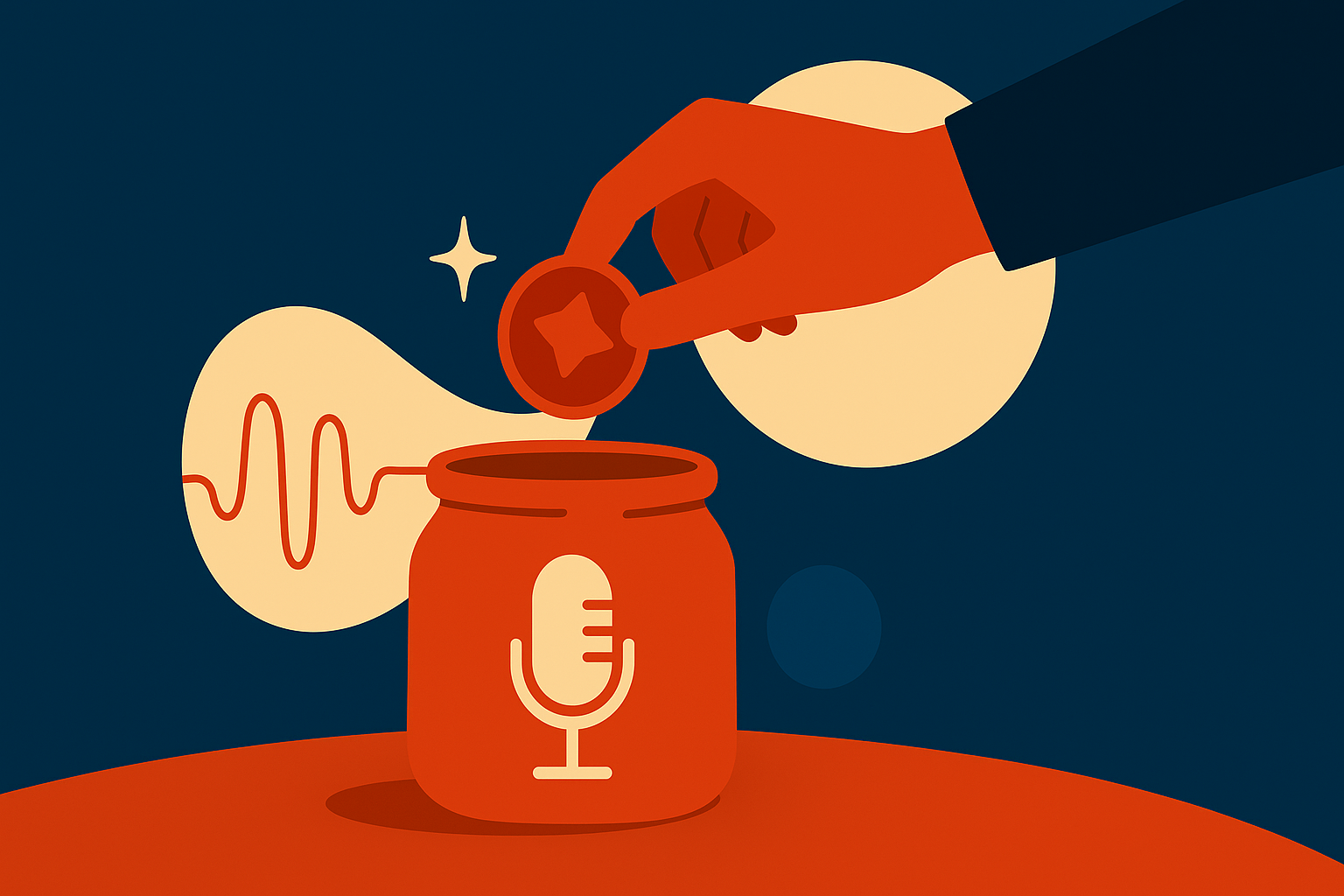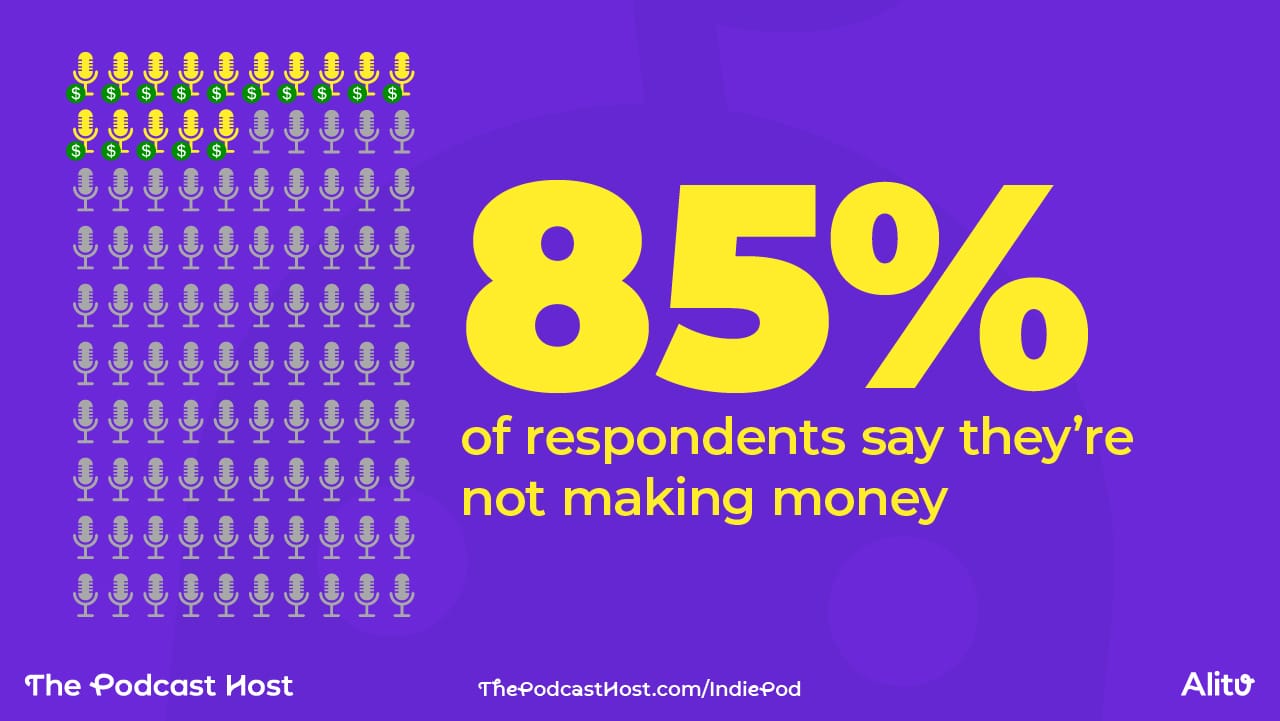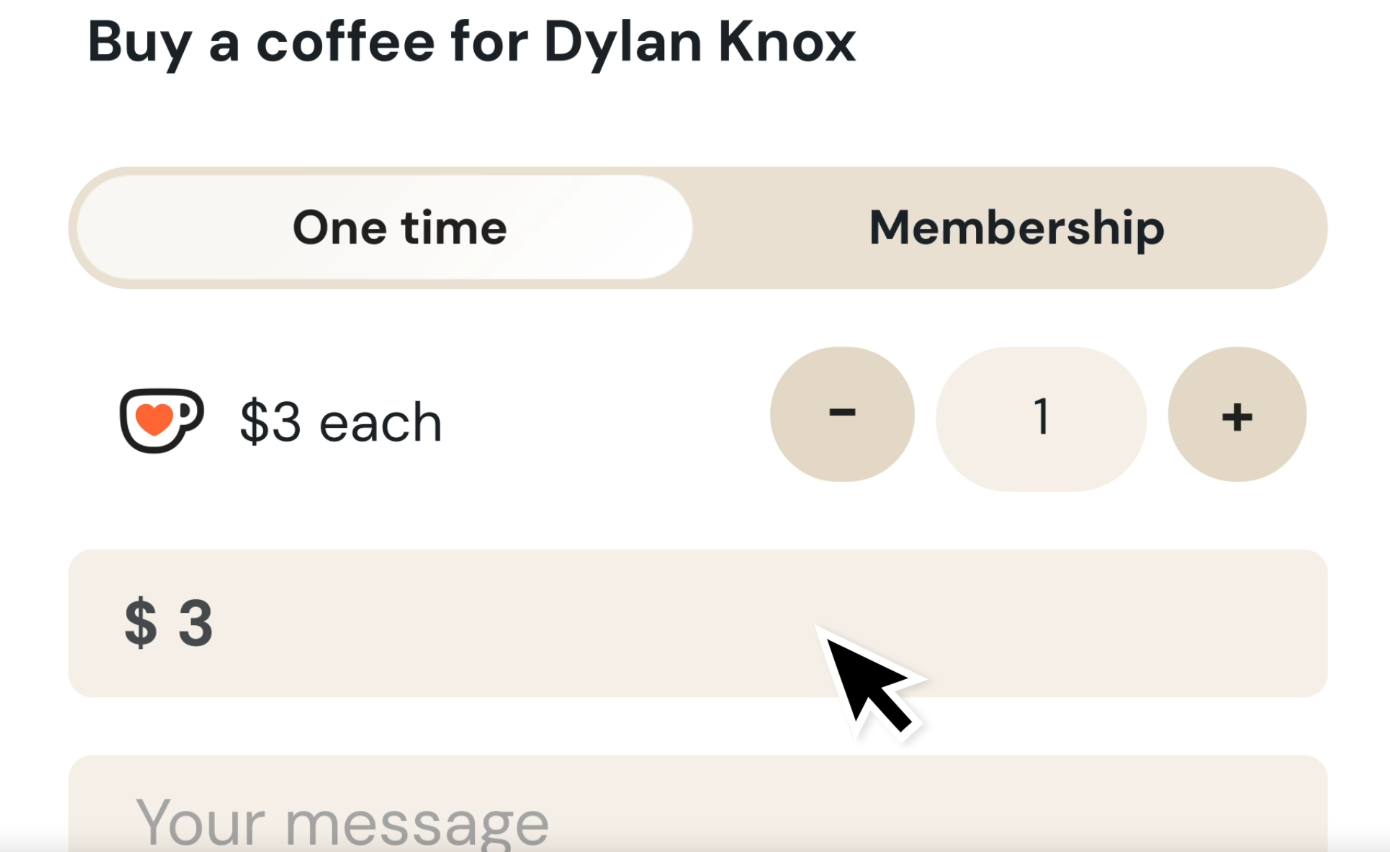Patreon Vs Ko-Fi Vs Buy Me a Coffee: Best Fan Funding Platform?
Platforms like Patreon, Ko-Fi, and Buy Me a Coffee give your fans the means to support you. Buy which one is best at filling your cup with a latte loot?

In our recent Independent Podcaster Survey, 85% of respondents said they make no money from their podcast. If that sounds familiar, you're in good company. Many podcasters focus on community first, while others want to earn from their work. Fortunately, you can do both.
Crowdfunding platforms combine community and commerce. They let listeners contribute directly, helping you cover costs while deepening the relationship with your audience. Like the hat a busker passes around, a good crowdfunding platform is part transaction and part connection.

Three platforms stand out for their longevity and notoriety: Patreon, Ko-Fi, and Buy Me a Coffee. Let’s compare these leaders in crowdfunding, so you can decide what’s right for your podcast.
Patreon

This crowdfunding platform’s name is nearly synonymous with membership-based funding for independent creators. Since 2013, Patreon has evolved alongside technology and audience demand. Some podcasters have made hundreds of thousands of dollars per month by maintaining their back catalog on Patreon. Please note that these are exceptions to the majority of Patreon’s creators. In recent years, though, fiscal policy changes have angered creators and patrons alike.
Patreon claims to have over 300 million creators and over 10 million paying supporters every month. I could replace all my entertainment streaming services with the Patreon app because of the vast number of artists. For creators, though, the platform might not be as much fun. Here are some of the pros and cons of choosing Patreon to crowdfund your podcast.
Pros of Patreon
Patreon helps creators set up a page with posts that can include audio, video, images, or rich text. Creators can filter which support tiers can see these posts. Most importantly for podcasters, Patreon’s RSS feature enables them to set up a private audio feed that their supporters can use to download exclusive episodes via the podcast listening app of their choice.
Other features include integration with Spotify, community chats, and analytics on the creator’s end so they can see what interests their audience most. Patreon displays all new posts in a combined feed (with paid posts behind a paywall notification). Like social media, you may be able to convert casual Patreon scrollers into your fans. Best of all, you can start your Patreon account for free.
Patreon’s website design success stories and marketing copy make the brand as enticing as a luxury car company, and make content creation feel fun. But every rose has its thorn, as you’ll see next.
Cons of Patreon
Any platform with as much traffic as Patreon manages is bound to hit some bumps in the road. At high points, Patreon has acquired smaller companies and stoked rumors of an IPO. At low points, layoffs and security breaches have shaken users’ confidence in the platform. The company has been known to change radically in response to market fluctuation.
Spotify’s integration with Patreon seems easier for podcasters who already host their podcasts on Spotify than for Patreon users who need to adapt to the Spotify integration. One podcaster who spoke with me on condition of anonymity had been happy with Patreon’s private RSS feed for nearly 10 years. But, they said that the new Spotify integration made sharing exclusive audio content “a nightmare.”
As audience demand for independently created content has grown, attempts to add fees to creators’ pledges have caused turmoil. Understanding how and why Patreon charges and pays creators as it does has been confusing at best and punishing at worst. Now Patreon charges creators a flat percentage to simplify the issue. But the system’s not perfect, as you’ll learn in the next section.
Patreon’s Pricing
Over the years, Patreon has tried many different systems to charge creators without affecting their ability to attract pledges. Today, Patreon charges a 10% fee on creators’ earnings.
Simple, yes, but creators also pay these fees:
- Payment processing fees, which vary based on members’ location, currency, and payment method. In the US, Stripe usually charges 2.9% + $0.30 per transaction.
- Apple’s 30% App Store fee for iOS purchases, replacing Patreon’s standard payment processing fee for that transaction
- Currency conversion fee, which is 2.5%
- Taxes on fees, depending on the creator’s region
- Payout fee for transferring a creator’s balance to their preferred payout method (such as PayPal or a bank transfer). The fee depends on both the payout method and the creator’s payout currency.
Yes, it’s confusing and annoying. You can either spend your time examining payment invoices with a magnifying glass, or you can make a good podcast. Patreon knows its members would rather put time and effort into their content, not balance sheets, which gives them an advantage.
Choose Patreon if you want panache.
Patreon is like dating a glamorous influencer who gets bored easily. Everyone has heard of her, likes how she looks, and knows she's going where the action is. She’s also inconsistent and demanding, shifting her focus to whatever’s trending.
If you want your podcast’s crowdfunding to be part of a content marketplace that commands a lot of attention, choose Patreon. I used to monetize my podcast through Patreon, but I was tempted by too many good creators’ projects, and ended up pledging more money than I ever made. Fortunately, Patreon isn't the only crowdfunding platform in the world. Let’s look at a couple of alternatives.
Ko-Fi

Ko-Fi launched in 2011 as a simple way for fans to give creators small gifts in recognition of their work, much like buying them a cup of coffee. That simplicity remains its strength.
Creators can add a Ko-Fi link to their social media profiles, emails, blogs, or podcast show notes so supporters can easily send donations. As their audience grows, they can also use Ko-Fi to sell memberships and merchandise while staying connected with fans.
Unlike Patreon, which can become a creator’s main platform, Ko-Fi integrates smoothly with the tools most creators already use.
Pros of Ko-Fi
Anyone can start using Ko-Fi for free as an online tip jar. Your Ko-Fi link integrates easily with any platform, bridging the gap between supporters and creators. Anyone can send you money through Ko-Fi without creating an account (though Ko-Fi will gently encourage them to sign up so they can get updates on your future projects).
As your following grows, you can offer memberships, commissions, and sell merchandise. Like Patreon, you can post text, images, and videos on your Ko-Fi page for your members. You can also connect directly with your supporters through polls, comments, and a private Discord server.
Cons of Ko-Fi
Fortunately, criticisms of Ko-Fi are hard to find.
Unlike Patreon, Ko-Fi doesn't offer an exclusive RSS feed. But you can host your podcast privately and then share the RSS feed URL with your supporters in a private message.
Negative reviews on Trustpilot said that Ko-Fi was too quick to ban creators who posted content meant only for adults. The negative reviews specifically targeted Ko-Fi’s content guidelines, which prohibit hate speech, abuse, and illegal behavior. This isn't unique to Ko-Fi. I'd hope to find this on any reputable payment platform where users can share content.
Another criticism said that Ko-Fi should be searchable by content type, rather than by creator. But Ko-fi is designed for creators to share links to their content; it’s not meant to be a content marketplace.
Ko-Fi’s Pricing
Ko-Fi’s free tier means no service fees on tips. You can use Ko-Fi solely as an embeddable tip jar.
To use Ko-Fi for memberships, shop sales, and commissions, join the Contributor level. At this level, members pay 5% on all transactions, including tips.
PayPal and Stripe charge processing fees, usually 3% + $0.30 per transaction.
What if you need a predictable Ko-Fi payment? Ko-Fi Gold charges $12 per month, whether you make $10 or $100K. Stripe and PayPal still charge the fee as mentioned earlier.
Choose Ko-Fi if you want a utility belt.
You want a straightforward crowdfunding platform that grows with you. Like Batman’s utility belt, Ko-Fi offers tools and features that solve whatever problem you face without taking up much space. The simplicity, clarity, and usefulness of Ko-Fi’s service make it a winner in my book.
Buy Me a Coffee

Buy Me a Coffee is another “easy way to say thanks” that has grown into memberships, publishing exclusive content, and a storefront. The company started small and has remained lean.
Their website puts company transparency and mission front and center. Instead of explaining the features through sales pitches, Buy Me a Coffee’s Resources tab takes you directly to their Help Center. You know what the customer experience is like and how it works, right away.
Just like Ko-Fi and Patreon, you can create exclusive content, interact with your followers, and sell products in your storefront.
Pros of Buy Me a Coffee
Buy Me a Coffee is streamlined and mobile-friendly. You can generate unique buttons or widgets for your website or social media. The service integrates with Zapier so you can enhance your BuyMe a Coffee campaigns with dozens of apps. The official Buy Me a Coffee WordPress plugin removes friction between your WordPress posts and your fans' ability to support you.
Buy Me a Coffee even has a referral program. When your fans become creators and start getting paid, you get rewarded, too.
Cons of Buy Me a Coffee
Like Ko-Fi, Buy Me a Coffee is streamlined, but some creators may find it bare-bones.
Though audio posts are an option, RSS isn’t. Again, you can privately host your podcast and share the RSS feed URL with your supporters as a workaround.
Some TrustPilot reviews said Buy Me a Coffee users had difficulty receiving payouts promptly. Others said they had difficulty finding saved drafts of posts or products. However, Buy Me a Coffee responded directly and offered assistance to all of the negative reviews.
Buy Me a Coffee’s referral program is unique among crowdfunding platforms. But its ultimate reward is priority customer service, which doesn’t raise my confidence. Can I get good customer service without referrals?
Buy Me a Coffee’s Pricing
Buy Me a Coffee charges a flat 5% per transaction fee. Stripe charges a payment processing fee of 2.9% + $0.30 per successful transaction and a 0.5% fee for payout processing. Additionally, international transactions incur a 1% processing fee, and international subscription payments require a 0.5% processing fee.
Choose Buy Me a Coffee for an essential tool kit.
Buy Me a Coffee offers a truly straightforward funding experience at a lower price than its competitors. It’s like a basic sewing kit: it won’t make an opera costume, but it’ll keep your pants from falling down. If you need to monetize your podcast with basic features and fewer distractions, this is a good choice.
Patreon Vs Ko-Fi Vs Buy Me a Coffee: The Takeaway Cup
- Patreon is synonymous with memberships and community funding, but its fee structure can be confusing, and bonus content has become an expectation.
- Ko-Fi is simple and charming, with one of the most straightforward fee systems available.
- Buy Me a Coffee offers strong integration tools and a solid referral program, though, like Ko-Fi, its elegant simplicity can also feel bare bones to some creators.
Your choice of crowdfunding platform should reflect your podcast’s goals. Avoid paying for features you'll never use or joining a platform that cannot grow with you. Exploring these three options will help you decide which suits you best and show you what to look for in any other platform you consider.
Whether your focus is on community, income, or both, these platforms can help. Be sure to read the fine print to ensure the one you choose aligns with your goals. Crowdfunding won't replace sponsorship, merchandise, or live events, but it gives your listeners a simple way to stay connected and support your podcast.
If you want to turn that support into long-term sustainability, join the Podcraft Academy. Inside, we help refine your monetization strategy, build realistic systems, and remove the guesswork from growing your show. It is not just about resources; it is about real guidance and hands-on help from people who have done it before!
